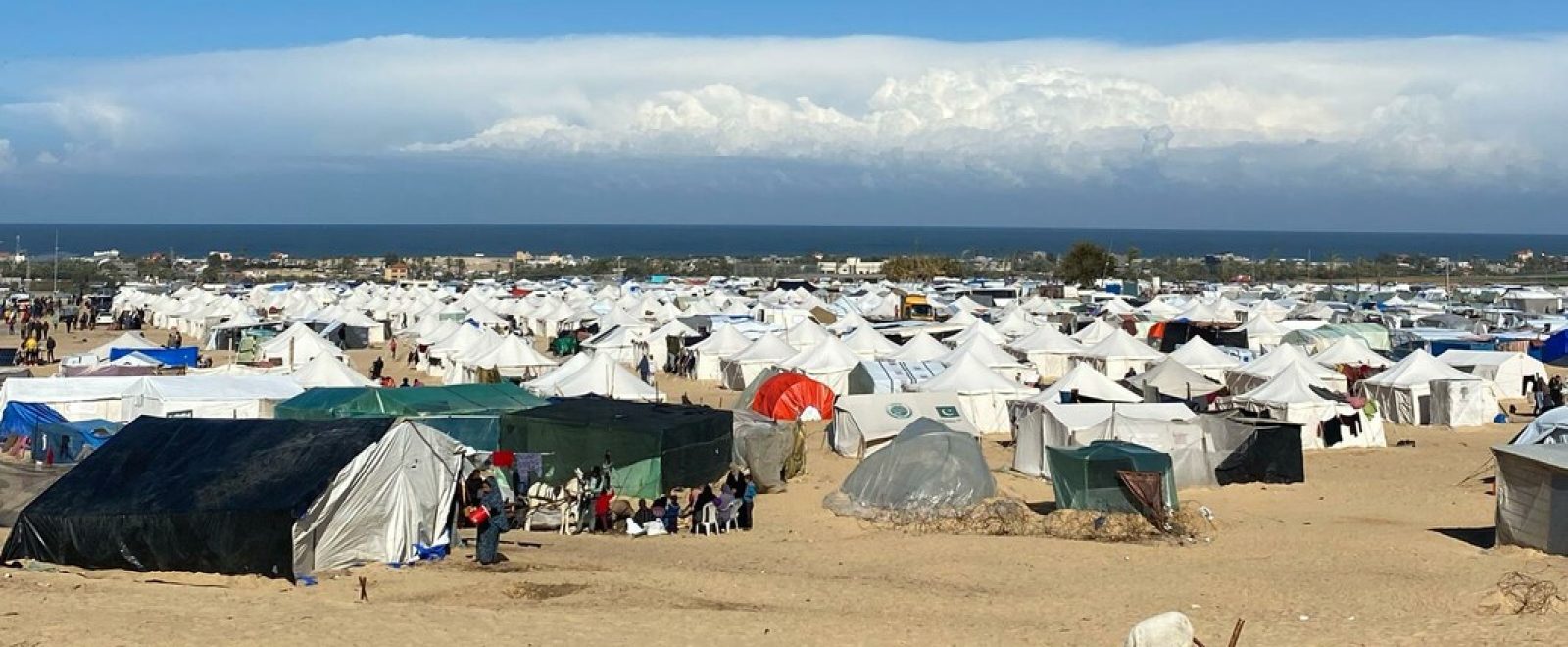This year’s celebrations to mark Eid al-Fitr in Gaza will be vastly different from most – instead of welcoming the end of the month of Ramadan with music, gifts, and sweets, people are struggling to survive amid near-constant bombardment and a severe lack of food and water.
Eid in Palestine usually sees people visit family and friends, wear new clothes, and prepare sweet treats like Ma’amoul, but with only limited aid entering Gaza, people will not even have the bare essentials to eat, while many of the mosques, parks, and historic buildings people would have previously visited have now been reduced to rubble.
In the West Bank, and in many Muslims communities across the world, celebrations will be cancelled or muted in solidarity with Gaza, where – after six months of bombing – the death toll has passed 33,000 and famine is imminent, with children already dying of malnutrition and dehydration.
Ishaaq*, who was displaced to southern Gaza with his family, says he has sometimes gone two whole days without eating anything, but that children were suffering the most. He said:
“It is such a difficult situation with regards to food. It is unbearable and unbelievably tough. As adults, we try to get by with little food to fill our bellies. But children… This food is not enough for children [who are] growing. It is horrible! It’s a very bad situation. I look into these kids’ eyes…and it fills my heart with sorrow. The way they look at food, like it is a miracle. Children are showing clear signs of malnutrition and suffering from diarrhea. Their condition is clear to anyone who cares to look. As the days have gone by, and as the war has continued, food became more and more scarce.
We came south for shelter and aid, but the situation here is way worse. It feels like we’re being played. It is feels like we’re being dangled a carrot that we can never reach…But now that we hear what’s happening up north…I guess we’re alive and that’s alright.
I would spend two days in a row without food, especially if we were moving. I sent my son to find us food; to get a piece of bread or anything to eat at all. He’d either come back with nothing, or he’d get a small piece of bread, dry bread filled with sand. And I would eat it, because I had nothing else to eat.”
Amani*, 29, whose family of five is living in one small tent, says she has nothing to feed her six-month-old baby and that her older children – aged 12 and 9 – both have problems with their health due to the lack of food and poor conditions. She said:
“My infant needs food; He needs formula and baby food, but I can’t provide it…My baby fell ill, and we suffer from bug bites. Our tent is small; it barely contains the five of us. We only stay in our tent to sleep.
My nine-year-old suffered intestinal catarrh. And my oldest suffers constant abdominal cramps, and doctors thought he had jaundice… This is because of the lack of food, and the conditions we live in.”
With conditions in Gaza already catastrophic, ActionAid is deeply alarmed by the prospect of a full ground invasion of Rafah, where more than a million people are sheltering. Let there be no doubt: escalating attacks in an area so densely overcrowded would result in a huge number of deaths and have disastrous consequences for Gaza’s already beleaguered aid operations, as Rafah hosts the main hub for aid distributions.
World leaders must do everything in their power to deter the Israeli authorities from carrying out an invasion and forcibly displacing those sheltering in Rafah, most of whom have already been displaced multiple times in the last six months.
Riham Jafari, Advocacy and Communications Coordinator at ActionAid Palestine, said:
“It is heartbreaking to think that, at what should be a special time of joy and celebration, people in Gaza will be spending Eid al-Fitr fearing for their lives and wondering if they will be able to feed their families. Instead of celebrating new beginnings, today, they are confronted with more of the same horror and trauma they have lived with for six months now.
The humanitarian catastrophe in Gaza is worsening by the day. Despite news that the Erez crossing, and port of Ashdod will be opened, aid is still not entering Gaza at anything like the scale required to keep starvation and famine at bay.
A ground invasion in Rafah would unleash further chaos, causing unimaginable death and destruction and throwing aid operations into disarray. The consequences for people in Gaza, who are already on the brink of starvation, are hard to fathom.
A permanent and immediate ceasefire has never been more urgently needed. More than two weeks have now passed since the UN Security Council called for a ceasefire in Gaza – states must now do everything in their power to ensure this is implemented, using every diplomatic lever available, from ceasing arms sales to implementing sanctions.”
ENDS
For media requests, please email Jenna.Farineau@actionaid.org or call 202-731-9593.
Spokespeople are available:
- Niranjali Amerasinghe, Executive Director of ActionAid USA
- Riham Jafari, Coordinator of Advocacy and Communication for ActionAid Palestine
About ActionAid
ActionAid is a global federation working with more than 41 million people living in more than 71 of the world’s poorest countries. We want to see a just, fair, and sustainable world, in which everybody enjoys the right to a life of dignity, and freedom from poverty and oppression. We work to achieve social justice and gender equality and to eradicate poverty.


